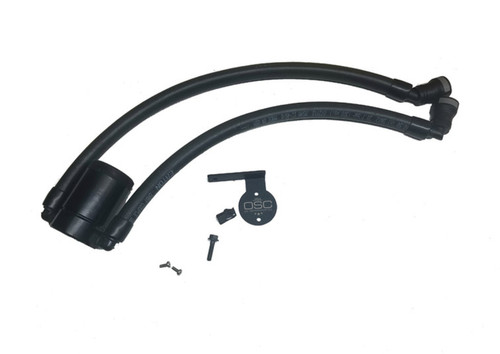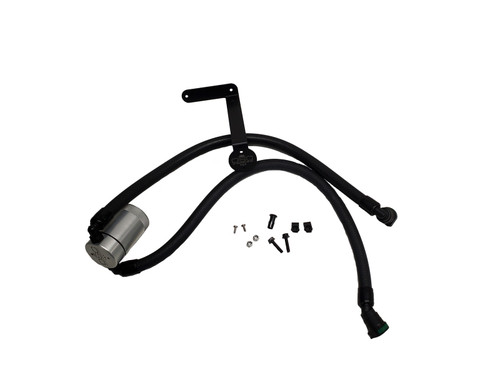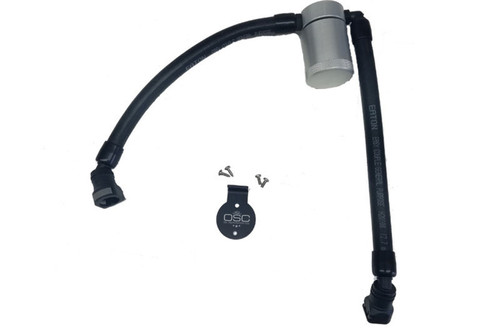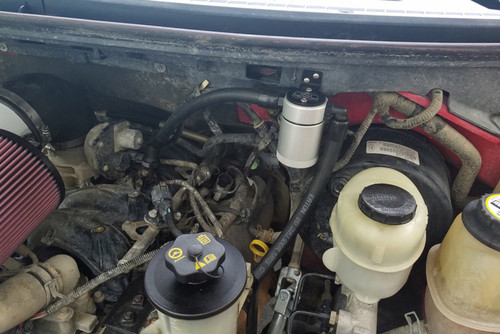During the process of venting crankcase pressure back through your intake track, large amounts of oil, in the form of vapors can gather/accumulate in your intake tube, intake manifold runners and even dilute your gas, lowering its octane level. This happens on all engines and is even worse with forced inducted vehicles (supercharged and turbocharged) as crankcase pressures are increased. To combat this, we have developed an oil separator of our own design. Milled from solid billet aluminum this is a rock-solid piece. It has a knurled tank base for easy removal to drain the spent oil and an O-ring seal to prevent any leaks.
Filtering consists of a fine mesh stainless steel screen that traps fine oil vapors and releases them once heavy enough to fall. They then pass through a 1/2" thick 1/16th" aluminum honeycomb filter where they grow every larger and then fall into the bottom. By the time the oil gets through the filter it's too heavy to be passed on into the intake. The tank holds 3 oz of fluid, while that may not sound like a lot, you shouldn*t see that much oil in your PCV system. Drain it every 2000-3000 miles and you will never come close to filling it.
J&L Oil Separator 3.0, Driver Side, Clear Anodized (2011-2017 F-150 - 5.0L; 6.2L/SVT Raptor; 5.0L & 6.2L/SVT Raptor with Roush Supercharger )
Fitment:
FordF-150FX22011
FordF-150FX22012
FordF-150FX22013
FordF-150FX22014
FordF-150FX42011
FordF-150FX42012
FordF-150FX42013
FordF-150FX42014
FordF-150Harley-Davidson Edition2011
FordF-150Harley-Davidson Edition2012
FordF-150King Ranch2011
FordF-150King Ranch2012
FordF-150King Ranch2013
FordF-150King Ranch2014
FordF-150King Ranch2015
FordF-150King Ranch2016
FordF-150King Ranch2017
FordF-150Lariat2011
FordF-150Lariat2012
FordF-150Lariat2013
FordF-150Lariat2014
FordF-150Lariat2015
FordF-150Lariat2016
FordF-150Lariat2017
FordF-150Lariat Limited2011
FordF-150Platinum2011
FordF-150Platinum2012
FordF-150Platinum2013
FordF-150Platinum2014
FordF-150Platinum2015
FordF-150Platinum2016
FordF-150Platinum2017
FordF-150SSV2016
FordF-150SSV2017
FordF-150STX2011
FordF-150STX2012
FordF-150STX2013
FordF-150STX2014
FordF-150SVT Raptor2011
FordF-150SVT Raptor2012
FordF-150SVT Raptor2013
FordF-150SVT Raptor2014
FordF-150XL2011
FordF-150XL2012
FordF-150XL2013
FordF-150XL2014
FordF-150XL2015
FordF-150XL2016
FordF-150XL2017
FordF-150XLT2011
FordF-150XLT2012
FordF-150XLT2013
FordF-150XLT2014
FordF-150XLT2015
FordF-150XLT2016
FordF-150XLT2017
J&L
J&L 11-17 Ford F-150 5.0L / 11-14 Ford F-150 6.2L Driver Side Oil Separator 3.0 - Clear Anodized
$169.00
- SKU:
- 3016D-C
- UPC:
- 887753721266
Related Products
An relatable roduct












